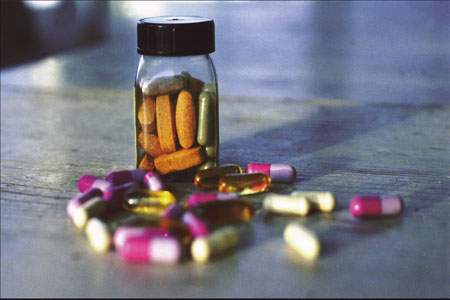
Are You Anxious About Your Health?
Issue 1 Sept / Oct 2003
Recently I have been feeling very low and my doctor thinks I may be depressed. He suggested I take antidepressants but I am worried that I’ll become dependant on tablets. I should be able to simply pull myself together and snap out of it shouldn’t I?
Unfortunately it is not that easy. As anyone who has suffered will know, depression is not something you can simply turn on and off at will. As you may well be discovering for yourself, being depressed means you are left feeling tired and de-motivated. You may also find your sleep, appetite, concentration, and memory are disturbed. On top of all this your self-esteem is usually rock-bottom, often leading to selfblame for the feelings you are experiencing. Reading between the lines I get the impression that you feel guilty about what you are going through. This is in itself a symptom of depression and only serves to make you feel worse. The good news is that depression can be effectively treated with antidepressants. You are not alone in your reluctance to taken antidepressant tablets, but most people who are treated in this way do successfully stop their tablets at the end of treatment. Your doctor will, however, probably advise that you stay on your tablets for at least six months after you are fully recovered to avoid any risk of relapse. If you still feel that table treatment is not for you, then I would suggest you discuss with your doctor the alternative ‘talking’ therapies that are available. These focus on changing one’s patterns of thinking and are usually provided by a psychologist.
My mother has recently been diagnosed with osteomalacia. She lived in East Africa for most of her life but came to live in the UK several years ago. I have been told this disease may be linked with her diet but she never had any problems before and she has been largely vegetarian all her life. Why has this happened now?
Osteomalacia means softening of the bones. This can cause bone and muscle pain as well as muscle weakness. Your mother may be finding it difficult or uncomfortable to walk as a result. It is usually caused by a lack of vitamin D. Vitamin D is produced in the skin when sunlight falls on it and can also be obtained through the diet. The darker one’s skin the less vitamin D that forms. The condition is common in women such as your other who are born in sunnier climes but living in the West. This is because whilst your mother was in East Africa the high degree of sunshine would have produced enough vitamin D. However, the reduced sunshine in the UK, combined with a l ow vitamin D intake due to a vegetarian diet, has meant your mother has become vitamin D deficient. Fortunately there is a simple solution – more vitamin D! Your mother’s GP can prescribe vitamin D supplements. A balanced diet which includes good sources of vitamin D such as liver and fish oils can also help.
The documentary on Michael Jackson reported his suffering from vitiligo is the cause of his now pale appearance. My father had this condition and I am now wondering if I am also at risk and what it means if I am?
Vitiligo affects 1% of the population. It occurs when the cells responsible for skin colour are lost from areas of the skin causing pale patches to develop. Vitiligo does have a tendency to run in families but not always. You have not included your age but most people with vitiligo will have noticed pale areas of skin by the time they are twenty. The first areas to be affected are usually the fingers, hands, face and private parts. Hair in the affected area may also turn white. In some people the condition has been known to spontaneously resolve, although this is rare. Many people find the use of cosmetic make-up and sunscreens helpful but in more severe cases it may be worth trying more specialised treatments such as steroids or light therapy. Light therapy was developed from Middle Eastern traditional therapy using substances taken from plants and applied to the skin or taken as tablets. In the skin these substances are activated by sunlight and restore the skin’s colour.
Recently I was given peppermint water when I had a bout of indigestion. I was very surprised to find that it worked so well and am interested to know more about this use of peppermint since until now I had thought of it simply as a flavour of sweet.
There is far more to peppermint than first meets the eye and it has a number of therapeutic uses. As you experienced first-hand, peppermint is excellent for soothing indigestion which it does by reducing the contractions of intestinal muscle. Hence our traditional indulgent behaviour of eating after-dinne r mints! Amongst its other uses,peppermint can also be used to help treat irritable bowel syndrome, to soothe menstrual cramps and as a pain-relieving ingredient in creams for arthritis
answers: Dr Lucy Spirling MBBS BSc University of London
images: Julia Neumann
Bookmark this |
|
Add to DIGG |
|
Add to del.icio.us |
|
Stumble this |
|
Share on Facebook |
|
Share this |
|
Send to a Friend |
|
Link to this |
|
Printer Friendly |
|
Print in plain text |
|


Comments
1 Comment
1
daniel li
14 Sep 16, 20:19
ok